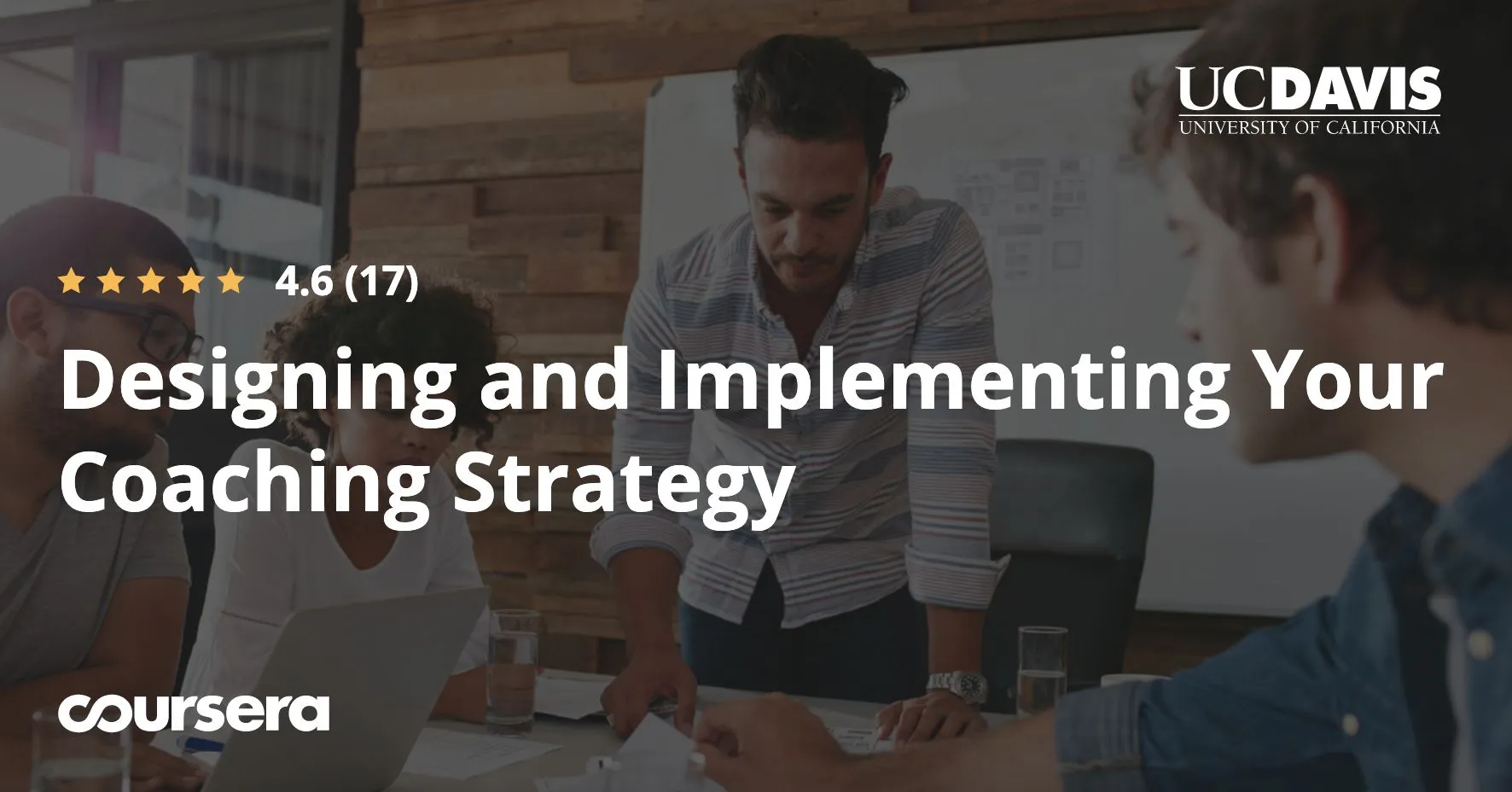
Designing and Implementing Your Coaching Strategy 
Managers must develop and implement a coaching strategy to effectively manage their teams in today's complex and fast-paced organizational environments. Coaching skills are essential to get the best work out of employees. ▼
ADVERTISEMENT
Course Feature
![]() Cost:
Cost:
Free
![]() Provider:
Provider:
Coursera
![]() Certificate:
Certificate:
No Information
![]() Language:
Language:
English
![]() Start Date:
Start Date:
Self Paced
Course Overview
❗The content presented here is sourced directly from Coursera platform. For comprehensive course details, including enrollment information, simply click on the 'Go to class' link on our website.
Updated in [March 06th, 2023]
This course, Designing and Implementing Your Coaching Strategy, provides learners with the opportunity to develop their own coaching strategy. Learners will be guided through the process of creating a coaching philosophy, developing a coaching practice, and creating coaching agendas. They will also learn how to handle everyday coaching conversations. By the end of the course, learners will have a comprehensive coaching strategy that they can use to improve their coaching conversations with their employees.
[Applications]
After completing this course, participants are encouraged to apply their newfound knowledge by developing a coaching strategy that is tailored to their organization's needs. This strategy should include a coaching philosophy, practice, and agendas that are designed to help employees reach their goals. Additionally, participants should practice their coaching skills in everyday conversations with their employees to ensure mastery of the material.
[Career Paths]
1. Executive Coach: Executive Coaches help executives and senior leaders develop their leadership skills and reach their goals. They provide guidance and support to help their clients identify and address areas of improvement, develop strategies for success, and create action plans to reach their goals. Executive Coaches are in high demand, as organizations recognize the value of having strong leaders.
2. Leadership Development Consultant: Leadership Development Consultants help organizations develop their leaders and create a culture of leadership. They work with organizations to assess their current leadership capabilities, develop strategies for improvement, and create programs to help leaders reach their goals. Leadership Development Consultants are in high demand, as organizations recognize the importance of having strong leaders.
3. Organizational Development Consultant: Organizational Development Consultants help organizations develop their organizational culture and create a culture of collaboration and innovation. They work with organizations to assess their current organizational capabilities, develop strategies for improvement, and create programs to help organizations reach their goals. Organizational Development Consultants are in high demand, as organizations recognize the importance of having a strong organizational culture.
4. Talent Management Consultant: Talent Management Consultants help organizations develop their talent and create a culture of talent development. They work with organizations to assess their current talent capabilities, develop strategies for improvement, and create programs to help organizations reach their goals. Talent Management Consultants are in high demand, as organizations recognize the importance of having a strong talent pipeline.
[Education Paths]
1. Bachelor of Science in Human Resources Management: This degree program focuses on the development and management of human resources in organizations. It covers topics such as recruitment, selection, training, and development, compensation and benefits, and labor relations. Students will also learn about the legal and ethical aspects of human resources management. This degree is ideal for those looking to pursue a career in human resources management, as it provides the necessary skills and knowledge to succeed in the field.
2. Master of Science in Organizational Leadership: This degree program focuses on the development of leadership skills and strategies for managing and leading teams and organizations. It covers topics such as organizational behavior, communication, decision-making, and problem-solving. Students will also learn about the principles of effective leadership and how to create a positive work environment. This degree is ideal for those looking to pursue a career in organizational leadership, as it provides the necessary skills and knowledge to succeed in the field.
3. Doctor of Philosophy in Organizational Development: This degree program focuses on the development of organizational systems and processes. It covers topics such as organizational design, change management, and organizational culture. Students will also learn about the principles of effective organizational development and how to create a positive work environment. This degree is ideal for those looking to pursue a career in organizational development, as it provides the necessary skills and knowledge to succeed in the field.
4. Master of Business Administration in Coaching and Mentoring: This degree program focuses on the development of coaching and mentoring skills and strategies for managing and leading teams and organizations. It covers topics such as coaching and mentoring theory, communication, decision-making, and problem-solving. Students will also learn about the principles of effective coaching and mentoring and how to create a positive work environment. This degree is ideal for those looking to pursue a career in coaching and mentoring, as it provides the necessary skills and knowledge to succeed in the field.
Pros & Cons

Excellent course design and content

Actual, Useful, Interesting

Helps in coaching job

Practical and oriented to non professional coaches

Sufficient content and opportunities to practice

Sharpens coaching skills

Great course

Excellent content

Too much reliance on videos

Limited wifi bandwidth and VPN use can be difficult
Course Provider

Provider Coursera's Stats at AZClass
Discussion and Reviews
0.0 (Based on 0 reviews)
Explore Similar Online Courses

LEAN SIX SIGMA Free Introduction Course

Fundamentals of Multiplayer Development in Unity

Python for Informatics: Exploring Information

Social Network Analysis

Introduction to Systematic Review and Meta-Analysis

The Analytics Edge

DCO042 - Python For Informatics

Causal Diagrams: Draw Your Assumptions Before Your Conclusions

Whole genome sequencing of bacterial genomes - tools and applications

Leadership Skills Mastery Vol 1: Leadership for 2019

What is Leadership?


Start your review of Designing and Implementing Your Coaching Strategy